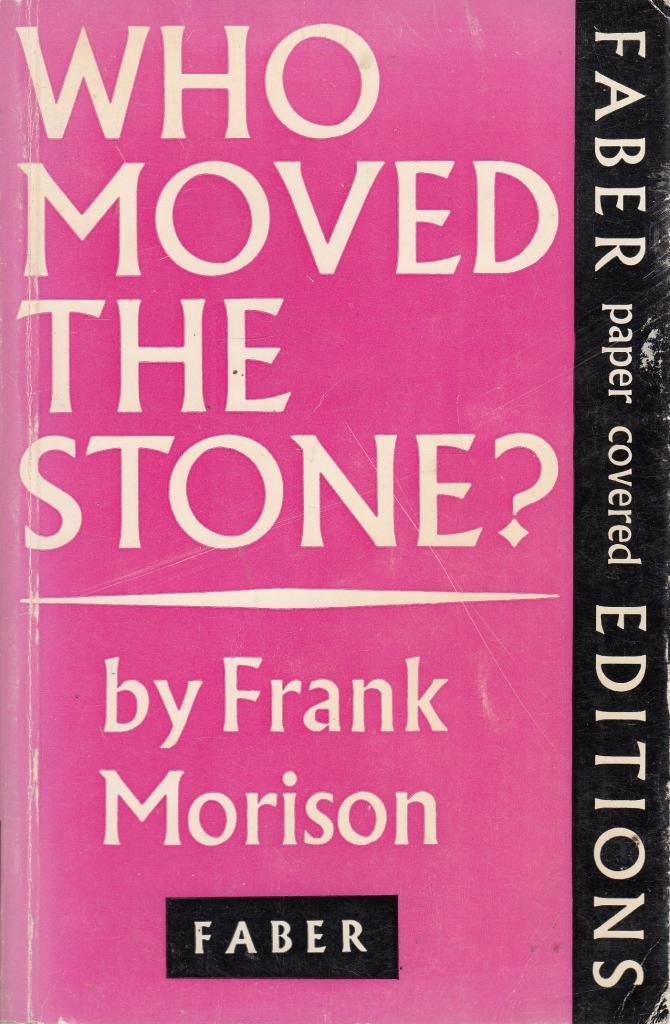About this deal
Who Moved The Stone is not a theological text, and does not pretend to answer the question of who Jesus is and what his death and resurrection represent. It seems that these questions have been left for the reader to consider themselves. Instead, Morison digs through the material that we have to paint a very clear picture on what happened on that weekend over two thousand years ago, and his research and methodology is very impressive. Unfortunately, having a biased view towards these events I cannot honestly say that I have been convinced, but rather I can say that his argument and his exploration of the evidence that we have is excellent. I was really impressed with this book. The author is a former journalist who really knows how to do his homework. As the story goes, originally this man was a skeptic about the divinity of the resurrection of Jesus Christ. He started out his research attempting to disprove the theory. However, after trying to unbiasedly look at all the evidence, he eventually changed his beliefs.
Letter to G. K. Chesterton, dated February 19, 1930, Letters of T. S. Eliot, Volume 5 1930–31, 107. This is another (older) work that was the conclusion of an attorney who set out to disprove the Resurrection of Jesus Christ, but ended up concluding that the Gospel accounts are true. Others include Simon Greenleaf, Josh McDowell, and then there is the journalist Lee Strobel, etc. However, the author reaches his positive conclusion in spite of some very wrong premises accepted by the author about the information and the Bible itself.
See Rev. D. Gardner Miller, “Who Moved The Stone?” Otago Daily Times, August 9 1930, 27.“Talks With Young Men,” Australian Christian Commonwealth, April 27, 1934, 10; “The Triumph of Easter,” Queensland Times, April 16, 1938, 11.“The Glorious Message of Easter: He Is Alive,” Derby Evening Telegraph, Saturday, April 16 1949, 3. There may be, and, as the writer thinks, there certainly is, a deep and profoundly historical basis for that much disputed sentence in the Apostles' Creed "The third day he rose again from the dead."' Morison, as said before, connects a lot of dots and speculates about what happened and why. He provides some scenarios as to who that man was and how that large stone was moved. However, the events of those four days will be open to speculation forever and will largely remain a mystery since there is no definitive way to prove what really happened. He uses the trail as evidence itself as well. An interesting point on Jesus saying he would raise this temple in three days
On Sayer's career at S. H. Benson see Alzine Stone Dale, Maker and Craftsman: The Story of Dorothy L. Sayers (Lincoln, New England: iUniverse, 2003) ISBN 978-0595266036 and Barbara Reynolds, Dorothy L. Sayers: Her Life and Soul (London: Hodder & Stoughton, 1993). ISBN 0312153538 Frank Morison, “I Was Crucified,” The Sphere, October 25, 1930, 162. “The Lord Gave the Land to the People?” The Sphere, June 27, 1931, 586. “The Pope’s Decree: The Date of the Crucifixion,” The Sphere, January 21, 1933, 76. “The Origin of Twelfth Night,” The Sphere, January 13, 1934, 64. It is not only a study on the Resurrection account as the title seems to suggest, but it retells the whole passion of Jesus Christ. Because the author does not concern himself with textual criticism, he is able to impress on the reader a consistent picture of the events of Passion and Resurrection. For this reason the book will perform a helpful service to everyone who wants a reconstruction of those events.”—Augustana Book NewsI am glad that Frank came to believe in the resurrected Jesus. But I found this book hard to enjoy much of the time. For starters, he would concede things like the idea that the last twelve verse of Mark were not written by Mark (debunked by Dean John W. Burgon in the 1880's and even confirmed as authentic text by textual critics like the late Bruce Metzger). He also concedes that verse 8 was not the final word from Mark. So, what does Frank believe? That the ending of Mark was LOST! Frank Morison, J. H. Jowett, M.A. of Birmingham: A Critical Appreciation (Birmingham: Allday, 1908). Re-released as J. H. Jowett M.A., D.D.: A Character Study (London: James Clarke, 1911).
After the arrest of Jesus, some of the disciples fled fearing they would be arrested while Peter and John apparently slipped into town behind the guards and their prisoner. Jesus was interrogated by the Sandrehen Council in the middle of the night and was treated unfairly by the questioners, the chief among them being Caiaphas. Morison concluded that Jesus was convicted by the Council by virtue of his own words. Usually, when one is trying to reconstruct a scene, after an interval of centuries, and, as in this case, with records which are admittedly brief, one has to rely upon the cumulative effect of small details to discover the key facts of the situation."Many people have gone out to write a book that Morison has attempted to write and some of these books have also been published, however the difference is that Morison went into his project with an open mind. Many of the other writers (who will not be named) have not done this. They already have a direction they wish to head, and will simply make point of fact statements (such as the gospels being unreliable) without actually digging much deeper to provide supporting evidence as to why they believe that the gospels are unreliable.
Related:
 Great Deal
Great Deal 